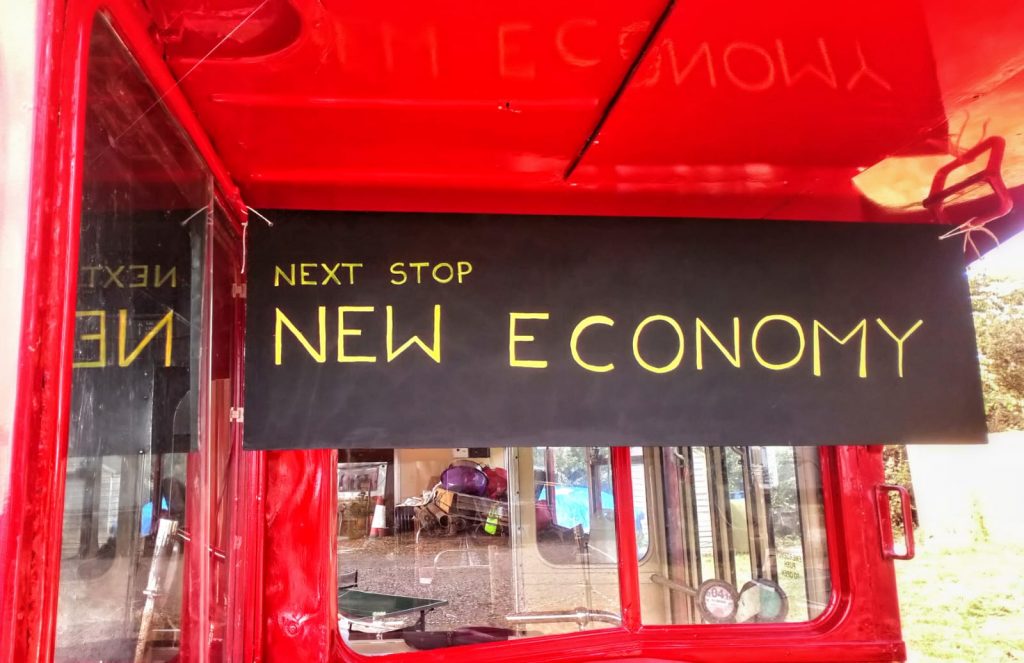Writing in a new collection of essays published by IPPR and WWF, Green New Deal member Caroline Lucas, writing with Ed Miliband and Laura Sandys, makes the case for the need for a clear vision at the heart of the Green New Deal.
With climate emergencies declared across the UK and the adoption of net-zero emissions targets by the UK, Scottish and Welsh governments, there’s an acceptance of the need to act. The challenge that lies before us now is to devise a plan which can provide the speed and scale required, and to win support for it.
Not only is time is running out to address the impacts of climate change and wider environmental breakdown, but there’s a lack of vision of what transformation to a modern, clean, decarbonised and environmentally rich economy could mean to people here and abroad. Too often debates on how to tackle climate change focus on the nightmare scenarios that lie ahead or retreat into technocratic discussions about technologies and targets, inviting fear or apathy, and sometimes both.

We need to move beyond the nightmare and begin to paint the dream by setting out the positive vision of the future that this transformation can deliver.
To succeed, we must situate climate change within the concerns that people have about their jobs, the fairness of society and the future for their kids and grandkids. This is not to obscure the scale of the challenge we face, but to show how with bold and inclusive action a better world can be created.
A Green New Deal offers both the opportunity to deliver that much-needed optimistic vision, and crucially a clear pathway for action to address the climate emergency through a reformed and renewed economy and society that places people at the heart of a just and fair transformation.
In order to achieve our ambition of a vibrant, healthy, forward-looking and innovative future, driven by the key principles of justice and equity, we’ll need to transform our economic model so that democratically elected governments, not the ‘invisible hand’ of the market, drive decision-making, and the goal of well-being for people and planet replaces GDP growth as our primary aim.

Fundamental changes to our democracy will be needed too, with more power devolved to communities, so they have a real say in the decisions that affect them.
By focusing investment particularly in those areas and communities which have been failed most by business as usual, and by ensuring that workers are in the forefront of designing a just transition, we’ll have the potential to build a broad and durable coalition that can sustain this ground-breaking transformation. It will also entail an unprecedented mobilisation of resources, delivered with the urgency that the crisis demands. Too often viewed as a cost, this endeavour should be considered an investment which will have significant benefits for our economy and society.
To deliver on the transition any programme must help support the industries of the future and the creation of high quality, skilled and well-paid jobs.
At the heart of a Green New Deal must therefore be an industrial strategy seeking not just to mitigate climate change but to unlock new opportunities for investment and innovation, tackle inequality, improve quality of life and deliver an environmentally sustainable economy.
A Green New Deal also offers us the opportunity to promote the wellbeing of all citizens. Retrofitting and insulating nearly 30 million homes across the country will cut energy bills, reduce emissions and create thousands of jobs to help deliver on this mammoth task. Investing in – and, as importantly, making accessible – sustainable forms of transport and zero-carbon vehicles as quickly as possible will prevent thousands of deaths from air pollution.
This transformation offers the opportunity not only to tackle economic and social inequalities but to transfer power to communities across the country too. Communities across the UK have varied and diverse needs and not all solutions can be developed centrally. Power and money must be devolved to enable local plans to emerge, liberating people to take decisions closer to home.
Crucially, any programme cannot be about tackling the climate crisis alone, but repairing our natural environment too. Restoring nature is beneficial in itself, helps tackle climate change and brings significant economic and social benefits, not least by improving physical and mental health. Naturally this will require a reshaping of land use and agriculture, providing both environmental and health benefits.
Some people have already argued that the UK should not act on these issues alone, or that what we do hardly matters in comparison to countries like China. We disagree. We believe there’s economic and societal advantage, not detriment, in doing so. We also believe our leadership can make a difference. It was the moral authority from the world-leading cross-party Climate Change Act of 2008 that has allowed successive governments to have international influence, including on the ground-breaking Paris Agreement.
With the UK hosting the UN COP climate change summit in 2020, we’ll need to increase our ambition here at home, set out a clear plan and start making some challenging decisions now. If the UK is to lead again, then implementing a Green New Deal is the best way to secure that leadership. And when people ask how we can bring the country together, we believe that the Green New Deal has the potential to help to do so. For some it will be the climate issue that motivates them, for others the economic and social justice gains that will be delivered. For many it will be all of these. We owe it to our country and its future to make this happen.
The collection, published on 22nd October 2019, also includes essays by Colin Hines and Ann Pettifor.
